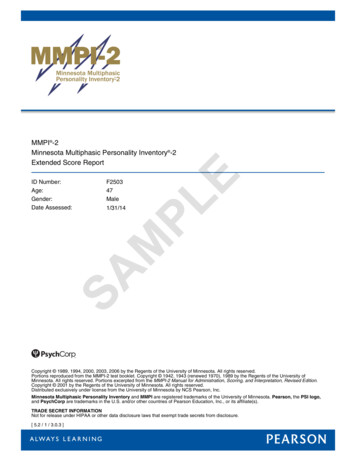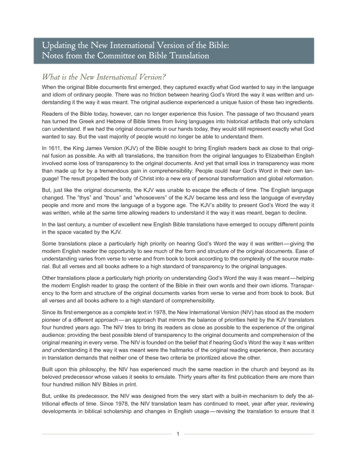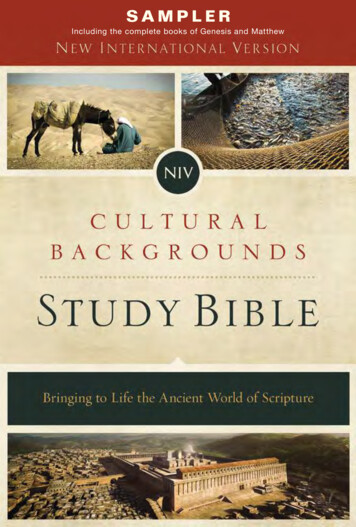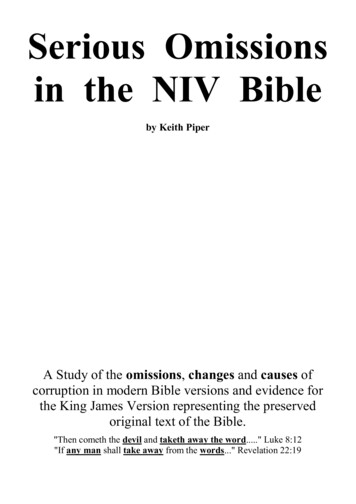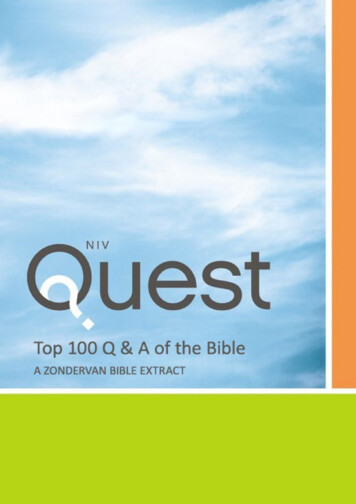
Transcription
NIV, Top 100 Most-Asked Questions of the Bible: Excerpts from The Quest Study BiblePublished by Zondervan, 2020Grand Rapids, Michigan 49530, USAAll rights reserved.www.Zondervan.comThe NIV Concordance copyright 1982, 1984 by Zondervan. Maps by International Mapping. Copyright 2009 by Zondervan. All rights reserved.“New International Version” and “NIV” are registered trademarks of Biblica, Inc. Used by permission.ePub Edition February 2020: ISBN 978-0-3104-1133-8The NIV text may be quoted in any form (written, visual, electronic or audio), up to and inclusive of fivehundred (500) verses without the express written permission of the publisher, providing the verses quoteddo not amount to a complete book of the Bible nor do the verses quoted account for twenty-five percent(25%) or more of the total text of the work in which they are quoted.Notice of copyright must appear on the title or copyright page as follows:Scripture quotations taken from The Holy Bible, New International Version , NIV .Copyright 1973, 1978, 1984, 2011 by Biblica, Inc. Used by permission. All rights reserved worldwide.The “NIV” and “New International Version” are trademarks registered in the United States Patent andTrademark Office by Biblica, Inc. When quotations from the NIV text are used by a local church in non-saleable media such as churchbulletins, orders of service, posters, overhead transparencies, or similar materials, a complete copyrightnotice is not required, but the initials (NIV ) must appear at the end of each quotation.Any commentary or other biblical reference work produced for commercial sale, that uses the NIV textmust obtain written permission for use of the NIV text.Permission requests for commercial use within the USA and Canada that exceeds the above guidelinesmust be directed to and approved in writing by Zondervan, 5300 Patterson Ave. SE, Grand Rapids, MI49530, USA. www.Zondervan.comPermission requests for commercial use within the UK, EU and EFTA that exceeds the above guidelinesmust be directed to and approved in writing by Hodder& Stoughton Limited, 338 Euston Road, London NW13BH, United Kingdom. www.Hodder.co.ukPermission requests for non-commercial use that exceeds the above guidelines must be directed to andapproved in writing by Biblica US, Inc., 1820 Jet Stream Drive, Colorado Springs, CO 80921, USA.www.Biblica.comAny Internet addresses (websites, blogs, etc.) and telephone numbers in this Bible are offered as aresource. They are not intended in any way to be or imply an endorsement by Zondervan, nor doesZondervan vouch for the content of these sites and numbers for the life of the Bible.All rights reserved.NT10910A portion of the purchase price of your NIV Bible is provided to Biblica so together we support the missionof Transforming Lives Through God’s Word.Biblica provides God’s Word to people through translation, publishing and Bible engagement in Africa,Asia Pacific, Europe, Latin America, Middle East, and North America. Through its worldwide reach, Biblicaengages people with God’s Word so that their lives are transformed through a relationship with JesusChrist.
Information about External Hyperlinks in this ebookPlease note that footnotes in this ebook may contain hyperlinks to externalwebsites as part of bibliographic citations. These hyperlinks have not beenactivated by the publisher, who cannot verify the accuracy of these links beyondthe date of publication.
CHow to Use this Zondervan Bible ExtractIndex of the Top 100 QuestionsOther NIV Quest Study Bible eBooks
HUTEZBThank you for purchasing NIV, Top 100 Most-Asked Questions ofthe Bible: Excerpts from The Quest Study Bible. This digital extractfrom the NIV Quest Study Bible is designed to address the top 100common, uncommon, and perplexing questions people ask aboutScripture. While it does not contain the full Bible, it does contain allthe verses associated with the top 100 questions & answers Biblereading plan.Each Top 100 question and its answer are indicated by aicon.A complete Index of the Top 100 Questions is also available.Included in some reference notes will be additional Scripturereferences. Use these references with a complete Bible to divedeeper into Bible study.The NIV Quest Study Bible has clarified the meaning of theScriptures for countless people. This Zondervan Bible Extract willdo the same for you.A complete Quest Study Bible, containing 7000 questions &answers is also available.We hope you enjoy reading NIV, Top 100 Most-Asked Questions ofthe Bible: Excerpts from The Quest Study Bible.
IT100 Q
GenesisAre these literal 24-hour days?Is “one man, one woman” the only kind of union God approves of?What are angels, and how do they interact with the world today?
ExodusWho is God, what does he value, and how can we approach him?How do I balance concern for the poor with the needs of my family?Can our prayers cause God to change his mind?
LeviticusHow are these laws relevant to us today?Is there anything wrong with same-sex relations?Are Christians required to tithe?
DeuteronomyWhich is better, spiritually speaking—to be rich or poor?Does the Bible speak to the issue of immigration?Is there a connection between spiritual and physical health?Why does God allow bad things to happen?
JoshuaWhat values does a Christian family hold?
JudgesCan we determine God’s will by “putting out a fleece”?
RuthWhich of the Bible’s instructions regarding male and female roles are specific tofirst-century culture?
1 KingsDoes it matter when and where we pray?
2 ChroniclesCan the Bible exaggerate and still be true?
EzraHow can we handle guilt and regret over our past decisions?
NehemiahShould Christians today observe the Sabbath?
JobAre people just pawns in God’s chess game?Is God responsible for Satan’s actions or people’s sins?How much does the Bible explain about the afterlife?If we are treated unfairly, is God still good?
PsalmsWhy does it sometimes seem like God is far away?Why do our prayers seem ineffective at times?Does God send troubles?If I have a relationship with God, why do I feel so lonely?Why does God choose some people and reject others?Does anything prevent God from responding to our prayers?How does a person meditate on God’s Word?Is there any “secular” evidence to support the Bible’s claims?Is it wrong for Christians to use contraception?Does the Bible define when human life begins?Does God approve of war?
ProverbsHow do I show love to people who violate God’s standards without endorsingtheir sin?How should children be disciplined?How can parents prepare their children to impact the world?Is it wrong for both parents to work outside of the home?
EcclesiastesHow does God want us to save, spend and give our money?What is the best way to share our faith in the workplace?
Song of SongsWhat does the Bible say about sex?
IsaiahHow involved should Christians be in caring for the earth?What does the Bible definitively reveal about creation?
JeremiahDoes God change his plans based on what we do?Has God revealed himself differently to different cultures and time periods?
EzekielWhat does the Bible say about the dangers of pornography?
MatthewHow can we understand the Trinity?What is hell like?How can I tell if I have too much “stuff”?How involved should the church be in politics?What does it mean to love my neighbor?
MarkHow should Christians understand prayer?How can we, imperfect people, live the way Jesus wants us to live?Does the Bible approve of remarriage after divorce?Are natural disasters literally “acts of God”? Does he cause them?
LukeWhat are demons, and how do they interact with the world today?Does saving for retirement show a lack of trust in God?Does God expect me to forgive someone who keeps hurting me?
JohnIs there more to the gospel than being assured of heaven?Is accepting Jesus the only way for people to get to heaven?How can the Christian church become what Jesus intended?
ActsWhat is the Holy Spirit’s role in evangelism?What about those who have never heard about Jesus?Does it matter which Bible translation Christians use?What is the value of baptism?
RomansHow are we justified?Does sin ever quit?What determines a person’s eternal destination?
1 CorinthiansDoes God expect me to keep my mind and body pure in today’s culture?How do Christians practice evangelism in a culture that frowns on“proselytizing”?What is my purpose in life? And how can I be certain of it?How can we identify our spiritual gifts?
GalatiansIs there value in other religions like Islam, Buddhism and Hinduism?
EphesiansAs a Christian, am I supposed to do good works?What does the Bible mean about wives submitting to their husbands?What is spiritual warfare, and how does it affect me?
PhilippiansWhat can Christians do to become more like Jesus?
ColossiansIn what ways should the church be serving the world?How can we gain victory over secret sins?
1 ThessaloniansAre we tempted by Satan or by our own evil desires?What does it mean to be sanctified?
1 TimothyShould women be prohibited from certain leadership roles within the church?How important is it that we understand all doctrines correctly?
2 TimothyHow should Christians teach their children about God?Does the Bible have answers for all of today’s moral dilemmas?
TitusDoes it matter which denomination my church belongs to?
HebrewsHow do we know the Bible is true?Do Christians really need to attend church?What does it mean to have faith?
JamesIn what ways can people experience God today?Should we regularly confess our sins to other Christians?
1 PeterHow much influence does Satan have in the world today?
2 PeterWhat do we know about a new heaven and a new earth?Why are so many parts of the Bible difficult to understand?
1 JohnWhat happens to a Christian between death and the day of judgment?
RevelationWhat is heaven like?Does obedience bring prosperity?Can Christians lose their salvation?Does God give people a chance to believe in him after death?
Are these literal 24-hour days? (Genesis 1:3–31)Regardless of whether the “days” of creation were figurativeor literal 24-hour periods, this passage is a truthfuldescription of what took place. It indicates that there isintelligence, meaning and purpose behind all existence. Inother words, the word of God directed the method ofcreation as well as the source of creation (Ps 33:6, 9; Heb11:3). Yet human beings have been given the privilege ofexploring, through scientific investigation, how God mayhave engineered these events and how long he took to doso.Many understand the six days of creation as representinglong periods of time because the sun, which marks a 24-hourday, wasn’t created until the fourth day. And the word day isused in chapters 1–2 in three distinct ways: (1) asapproximately 12 hours of daylight (Ge 1:5); (2) as 24 hours(1:14) and (3) as a period of time involving, at the veryminimum, the whole creative activity from day one to dayseven (see 2:4, where the word that is translated when is thesame word that is elsewhere translated day). The light (1:3)could not have come from the earth’s sun if the sun was notcreated until the fourth day. The light could have come fromother sources that God provided in the universe prior to thecreation of the sun. We can only speculate about what theatmospheric conditions might have been at that time.3AndGod said, “Let there be light,” and there was light. 4Godsaw that the light was good, and he separated the light fromthe darkness. 5God called the light “day,” and the darkness hecalled “night.” And there was evening, and there was morning—the first day.6AndGod said, “Let there be a vault between the waters toseparate water from water.” 7So God made the vault andseparated the water under the vault from the water above it.
And it was so. 8God called the vault “sky.” And there wasevening, and there was morning—the second day.9AndGod said, “Let the water under the sky be gathered to oneplace, and let dry ground appear.” And it was so. 10God calledthe dry ground “land,” and the gathered waters he called“seas.” And God saw that it was good.11ThenGod said, “Let the land produce vegetation: seedbearing plants and trees on the land that bear fruit with seedin it, according to their various kinds.” And it was so. 12Theland produced vegetation: plants bearing seed according totheir kinds and trees bearing fruit with seed in it according totheir kinds. And God saw that it was good. 13And there wasevening, and there was morning—the third day.14AndGod said, “Let there be lights in the vault of the sky toseparate the day from the night, and let them serve as signsto mark sacred times, and days and years, 15and let them belights in the vault of the sky to give light on the earth.” And itwas so. 16God made two great lights—the greater light togovern the day and the lesser light to govern the night. Healso made the stars. 17God set them in the vault of the sky togive light on the earth, 18to govern the day and the night, andto separate light from darkness. And God saw that it wasgood. 19And there was evening, and there was morning—thefourth day.20AndGod said, “Let the water teem with living creatures, andlet birds fly above the earth across the vault of the sky.” 21SoGod created the great creatures of the sea and every livingthing with which the water teems and that moves about in it,according to their kinds, and every winged bird according toits kind. And God saw that it was good. 22God blessed themand said, “Be fruitful and increase in number and fill the waterin the seas, and let the birds increase on the earth.” 23Andthere was evening, and there was morning—the fifth day.
24AndGod said, “Let the land produce living creaturesaccording to their kinds: the livestock, the creatures thatmove along the ground, and the wild animals, each accordingto its kind.” And it was so. 25God made the wild animalsaccording to their kinds, the livestock according to their kinds,and all the creatures that move along the ground according totheir kinds. And God saw that it was good.26ThenGod said, “Let us make mankind in our image, inour likeness, so that they may rule over the fish in the seaand the birds in the sky, over the livestock and all the wildanimals,[1] and over all the creatures that move along theground.”27SoGod created mankind in his own image,in the image of God he created them;male and female he created them.28Godblessed them and said to them, “Be fruitful andincrease in number; fill the earth and subdue it. Rule over thefish in the sea and the birds in the sky and over every livingcreature that moves on the ground.”29ThenGod said, “I give you every seed-bearing plant onthe face of the whole earth and every tree that has fruit withseed in it. They will be yours for food. 30And to all the beastsof the earth and all the birds in the sky and all the creaturesthat move along the ground—everything that has the breathof life in it—I give every green plant for food.” And it was so.31Godsaw all that he had made, and it was very good. Andthere was evening, and there was morning—the sixth day.
Is “one man, one woman” the only kind of union Godapproves of? (Genesis 2:24)In a word, yes. Here’s what Jesus said about marriage: Atthe beginning the Creator “made them male and female,”and said, “For this reason a man will leave his father andmother and be united to his wife, and the two will becomeone flesh” (Mt 19:4–5).Scripture uses metaphorical language to describemarriage, picturing it in terms of a head and body.Ephesians 5:23 says, For the husband is the head of thewife as Christ is the head of the church, his body, of whichhe is the Savior. Headship has to do with oneness. The wifeis the body of the husband as the church is the body ofChrist (Col 1:18). The mystery of marriage is that the head(the husband) plus the body (the wife) equals one flesh.This head-body picture shows why God approves only ofmonogamous, heterosexual marriage: two heads (two men)do not equal one flesh, and two bodies (two women) do notequal one flesh. This is affirmed many times in Scripture(e.g., Lev 18:22; 1Co 6:9–11). This picture also shows whypolygamy is wrong: a head (one man) and two or morebodies (two or more wives) do not comprise a union of oneflesh. It is true that many people in Scripture practicedpolygamy—including Abraham, Jacob, David and Solomon—but those relationships ultimately produced many kinds ofstrife for each family. And although God chose to bring somegood out of those situations (e.g., the 12 tribes of Israel), thegoodness of God’s original plan was not changed.Finally, this picture of one-flesh union does not mean thatsingle people are incomplete or somehow worth less thanmarried people. The metaphorical image of one flesh is used inScripture to identify the boundaries of marriage and highlightthe institution as a picture of our relationship with Christ.Indeed, Paul (who was not married) made it clear in 1Corinthians 7:7–8 that marriage and singleness are both giftsto be used in service to God.
24Thatis why a man leaves his father and mother and is united to hiswife, and they become one flesh.
What are angels, and how do they interact with the worldtoday? (Genesis 28:12)Along with the creation of the physical world, God alsofashioned and populated a spiritual realm we call heaven.Little is known about heaven, which is the place where Goddwells, because it is beyond human observation. But theBible identifies some of its inhabitants as cherubim, or“winged beings” (Ex 25:18–22; Eze 10:1–22); others asseraphim, or “burning ones” (Isa 6:2; Rev 4:6–8); and manysimply as messengers (Ge 16:7–11; Ex 23:20–24; Mt 1:20–24), from which the term “angel” is derived. Together, thewhole company of angelic beings is called the multitudes ofheaven or the heavenly host (1Ki 22:19; Lk 2:13).In the Bible, angels and humans interacted primarily whenthese spiritual beings delivered messages from God to hispeople. But sometimes God sent angels to intervene inhuman affairs. For example, God sent an angel to guide theIsraelites through the desert (Ex 23:20–23), provide food forElijah (1Ki 19:5–8) and execute his divine judgment againstthe people of Israel (2Sa 24:16–17). While the ministry ofangels occurred most specifically in supervising theredemptive history outlined in the Bible, angels alsocommunicated God’s divine will directly to individuals (Ac10:3–5) and provided them with protection (Ac 12:11; 27:23).Throughout subsequent history many people have reportedthe presence of angelic beings who have communicatedspecific messages from God or intervened in specificsituations. The mysterious and transcendent character ofangels has sometimes nurtured cultic obsessions, but suchworship is clearly contrary to the Bible’s teaching (Col 2:18–19).12Hehad a dream in which he saw a stairway resting on the earth,with its top reaching to heaven, and the angels of God wereascending and descending on it.
Who is God, what does he value, and how can weapproach him? (Exodus 3:13–14)The Bible doesn’t explain who God is or try to prove hisdivine existence. It assumes God is eternally present (Ge1:1) and depicts creation as a result of his divine thoughtand action (Ge 1:1–2:25). God has, however, offered us aglimpse of who he is through creation (Ps 19:1–6), his Word(Ps 18:30–31), and especially through the incarnation of hisSon, Jesus Christ, who is the radiance of God’s glory andthe exact representation of his being (Heb 1:3). Jesusdemonstrated God’s compassion, grace and glory in his life,death and resurrection. From this and from the empoweringpresence of the Holy Spirit at Pentecost (Ac 2:1–13), ourawareness of God as Trinity (one God in three persons) wasformed.While God’s being is beyond comprehension or perception(Ex 33:20; Jn 1:18), both the physical world and the humanconscience clearly attest to his values and purposes. Inaddition, God revealed what he values through the Sinaicovenant (Ex 20:1–24:18). The Ten Commandments (Ex20:2–17; Dt 5:6–21) were affirmed by Jesus as a faithfulsummary of God’s moral values (Mt 5:17–47), and theycontinue to shape social values and legal systems today.God also revealed what he values through the dietaryregulations (Lev 11:1–47) and worship regulations (Lev 1:1–9:24; 16:1–34; 21:1–25:55) that were given to the ancientIsraelites. Those regulations emphasized God’s holinessand his desire for his people to be holy (Lev 11:44). WhenJesus came to earth, he taught that while actions areimportant, God is more concerned with the heart (Mt 5:17–47; 15:18–20). God desires that we love him, trust him, obeyhim and imitate his character in our interactions with othersby being compassionate, loving and forgiving.So how can we approach such a holy God? Access to God isonly through faith in Jesus Christ (Jn 14:6; Ro 5:1–2; Eph2:13–18; 3:12). Christ suffered once for sins, the righteous for
the unrighteous, to bring [us] to God (1Pe 3:18). Let us thenapproach God’s throne of grace with confidence, so that wemay receive mercy and find grace to help us in our time ofneed (Heb 4:16).13Mosessaid to God, “Suppose I go to the Israelites and say tothem, ‘The God of your fathers has sent me to you,’ and they askme, ‘What is his name?’ Then what shall I tell them?”14Godsaid to Moses, “I AM WHO I AM.[1] This is what you are to sayto the Israelites: ‘I AM has sent me to you.’ ”
How do I balance concern for the poor with the needs ofmy family? (Exodus 23:10–11)The poor mentioned in these verses are those who are inneed of basic necessities (e.g., food, clothing, shelter). Butelsewhere the Bible mentions other types of people who arepoor. Whereas Matthew recorded Jesus saying that the poorin spirit are blessed (Mt 5:3), Luke’s account states that thepoor are blessed by God (Lk 6:20). The poor in spiritreferred to in Matthew 5 are those who are spirituallybankrupt and desperate for God. The poor of Luke 6 arethose who are desperate because they have no one to carefor them. And the apostle Paul admonished Timothy to carefor the widows in his congregation, saying, Give properrecognition to those widows who are really in need (1Ti 5:3).The fundamental principle here is that God provides for theneeds of the poor (Mt 6:25–34). But the question is, Howdoes God do this? The answer is that he does this in avariety of ways. He often meets tangible needs through thegenerosity of his people, who want to give out of theabundance they have been given. And God is able to blessyou abundantly, so that in all things at all times, having allthat you need, you will abound in every good work (2Co9:8).But God also assigns responsibilities to certain individualswho are close to people with material needs. In 1 Timothy 5Paul said that local needs ought to be met by institutionsand individuals who are in closest proximity to those in need.So in the case of widows, Paul said that children orgrandchildren bear the first line of responsibility to care for awidow’s material needs (1Ti 5:4). But if the widow is all aloneand remains upright in her loneliness, then she is to becared for by the deacons (1Ti 5:5, 16). Give the peoplethese instructions, so that no one may be open to blame.Anyone who does not provide for their relatives, andespecially for their own household, has denied the faith andis worse than an unbeliever (1Ti 5:7–8).
So how do we balance concern for the poor with the needs ofour own family? There is no one-size-fits-all answer. We shouldbegin by examining the stance of our own heart in relation tothe apostle’s admonition to the Corinthians: Whoever sowssparingly will also reap sparingly, and whoever sowsgenerously will also reap generously. Each of you should givewhat you have decided in your heart to give, not reluctantly orunder compulsion, for God loves a cheerful giver (2Co 9:6–7).God has given his people ample resources to supply everyimaginable need.10“Forsix years you are to sow your fields and harvest the crops,11but during the seventh year let the land lie unplowed and unused.Then the poor among your people may get food from it, and the wildanimals may eat what is left. Do the same with your vineyard andyour olive grove.
Can our prayers cause God to change his mind? (Exodus32:14)Scripture teaches that God sometimes adjusts his plans inresponse to our actions or requests. The Bible containsseveral examples of this: the Hebrews on the outskirts ofCanaan (Nu 14:11–23); Hezekiah’s repentance on behalf ofIsrael (Am 7:1–7) and the sparing of Nineveh (Jnh 3:1–10).Experiencing God’s will is dynamic. As with anyinterpersonal relationship, God’s relationship with humanityinvolves complex twists and turns. God modifies hisresponses based on ours, and we adjust our responses toGod’s. So, in a sense, it can be said that God sometimeschanges his mind in response to our prayers.At the same time, God’s will is determined. There aredecrees and promises he has made that do not change. Hekept his covenant with the forefathers of the Israelites (Dt7:7–8), and he keeps his new covenant with those whobelieve in Jesus (Jn 6:37–40, 44). God wants us to live outhis will obediently. He has predetermined ways he expectsus to respond, but he has made us capable of resisting him(Ps 143:10; 1Th 5:16–18; Heb 10:35–39; 2Pe 3:9).These aspects of God’s will work together. While it is notpossible for us to fully understand how they work together, weknow that God is ultimately in control.14Thenthe LORD relented and did not bring on his people thedisaster he had threatened.
How are these laws relevant to us today? (Leviticus19:19–28)Though some of the laws in Leviticus seem readilyapplicable today, others do not. It can be unsettling to see ageneral principle (Love your neighbor, v. 18) alongside whatseems to be a culture-specific rule (Do not cut the hair at thesides of your head, v. 27). The result can be an apparentinconsistency in how we obey these laws. For example, howcan we continue to view homosexual intercourse as sin(20:13) if we no longer care about blended fabrics of cottonand wool (19:19)?People attempt to resolve this problem in different ways.Some believe the laws fit into different categories ofbehavior: moral laws are still binding, but ceremonial andcivil laws were superseded when Jesus came. Thedistinction between a moral, civil and ceremonial law is notalways clear, however. Others believe that only those lawsmentioned or repeated in the New Testament remainbinding.We can gain some insight into the problem by seeing whatJesus said about the law. He told his disciples that not asingle letter of the law would disappear until everything isaccomplished (Mt 5:17–20). Yet because Jesus followed thetrue spirit of the law rather than the legalistic views of thereligious teachers, he was accused of violating the law (Lk6:1–2).Because the Bible is God’s Word, we may assume thateach law expresses some aspect or enduring principle ofGod’s revealed will. Some details, written specifically forIsrael’s situation, will not fit ours today. But many of theregulating principles behind them are timeless. Matthew 5provides several examples where Jesus upheld the deeper,spiritual principles of the law.The relevance of Old Testament laws may elude ourunderstanding today because the content often addressedIsrael’s particular call to be God’s distinct people. However, by
seeking the timeless principle behind the letter of the law, wecan still apply God’s standards to the details of our lives withinthe context of our culture.19“‘Keep my decrees.“ ‘Do not mate different kinds of animals.“ ‘Do not plant your field with two kinds of seed.“ ‘Do not wear clothing woven of two kinds of material.20“‘If a man sleeps with a female slave who is promised to anotherman but who has not been ransomed or given her freedom, theremust be due punishment.[1] Yet they are not to be put to death,because she had not been freed. 21The man, however, must bring aram to the entrance to the tent of meeting for a guilt offering to theLORD. 22With the ram of the guilt offering the priest is to makeatonement for him before the LORD for the sin he has committed, andhis sin will be forgiven.23“‘When you enter the land and plant any kind of fruit tree, regardits fruit as forbidden.[2] For three years you are to consider itforbidden[3]; it must not be eaten. 24In the fourth year all its fruit willbe holy, an offering of praise to the LORD. 25But in the fifth year youmay eat its fruit. In this way your harvest will be increased. I am theLORD your God.26“‘Do not eat any meat with the blood still in it.“ ‘Do not practice divination or seek omens.27“‘Do not cut the hair at the sides of your head or clip off theedges of your beard.28“‘Do not cut your bodies for the dead or put tattoo marks onyourselves. I am the LORD.
Is there anything wrong with same-sex relations?(Leviticus 20:13)Humankind’s fall into sin has pushed us away from God andhis good purposes for our lives. As a result, our desires andpassions have become distorted and disoriented innumerous ways. The very beginning of the Bible presentsGod’s vision for human sexual relationships, and it describesthat relationship as being between a male and a female inthe covenant of marriage (Ge 2:24). Although the Biblecontains only a handful of references to same-sex relations,all of them are negative. In other words, engaging in samesex relations is one way that we can fall away from God’sgood vision for humanity.Perhaps the clearest reference to same-sex relations isfound in Romans 1:18–32, which begins by describinghumankind’s universal sinfulness in refusing to acknowledgeGod as the good creator and rightful ruler of our lives (Ro1:18–20). This passage continues by listing numeroussymptoms of our sinfulness. Engaging in hom
The NIV Quest Study Bible has clarified the meaning of the Scriptures for countless people. This Zondervan Bible Extract will do the same for you. A complete Quest Study Bible, containing 7000 questions & answers is also available. We hope you enjoy reading NIV, Top 100 Most-Asked Questions of
